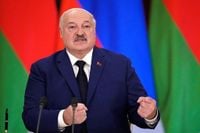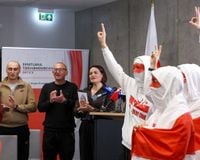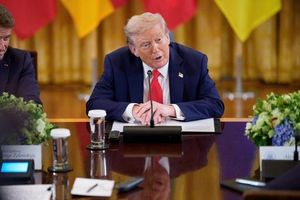Belarus has once again come under the global spotlight after President Alexander Lukashenko pardoned 25 prisoners, a move that follows closely on the heels of a larger prisoner release and signals a possible thaw in relations with the United States. Yet, behind the headlines, the reality for many of those freed—and for the country’s still-imprisoned dissidents—remains fraught with uncertainty, confusion, and continued repression.
On September 16, 2025, Lukashenko’s office announced the pardon of 25 individuals convicted of what authorities labeled as "extremist crimes." According to BelTA and The Kyiv Independent, the group included 12 women and 13 men, most under 40 years old, with several being parents and one who committed an offense as a minor. Officials emphasized that all had admitted guilt, expressed remorse, and pledged to lead law-abiding lives—an echo of the government’s longstanding demand for public contrition from political prisoners.
This latest round of pardons is part of a broader campaign to improve ties with the West, particularly the United States. Just days earlier, Belarus released 52 political prisoners after negotiations with a U.S. delegation, as reported by Reuters and The Associated Press. That group included opposition politicians, journalists, protesters, and 14 foreign nationals. Among the most prominent were opposition figure Nikolai Statkevich, journalist Ihar Losik, Belsat TV reporter Irina Slavnikova, and journalist-editor Pavel Mozheyko.
The releases didn’t come without strings attached. Following the agreement, Washington lifted sanctions on Belavia, Belarus’s state airline, allowing it to service and purchase parts for its Boeing aircraft. U.S. presidential envoy John Coale visited Minsk, expressing hopes to reopen the U.S. embassy in Belarus, though no date has been set. As Coale put it, "Washington wants to reopen its embassy in Minsk," a statement that many observers see as a sign of warming relations.
Yet, for many of those freed, the experience has been bittersweet. According to Reuters, most of the 52 released prisoners were deported to Lithuania, often against their wishes. Aleksandr Mantsevich, one of the released, described his confusion: "I wanted to go home, to my home in Belarus. They brought me here." About half of the group were nearing the end of their sentences, said Franak Viačorka, a senior opposition official. "Just imagine, they were looking forward to getting free soon and suddenly they find themselves deported, separated from family, they don’t have passports and they can’t go back."
Some, like opposition politician Mikola Statkevich, refused to leave Belarus. Statkevich, who had been in solitary confinement for over two years, turned back at the Lithuanian border and returned to Belarus. His wife, Marina Adamovič, has had no contact with him since. "Lukashenko’s regime has a problem, because he was officially released from jail but they cannot allow him to go home in Belarus. They will probably give him another criminal case," Viačorka told Reuters.
Others, like opposition journalist Iryna Slaunikava, expressed a desperate longing for home despite the dangers. "I want to go back home. I cannot imagine my life without Belarus. I want to go home," she told Reuters. Slaunikava had nearly completed her sentence, with just four months remaining. "Haven’t I earned the right to live at home?" she asked.
For families, the forced deportations have been particularly painful. Pavel Vinogradov, another former prisoner, was due to meet his son for the first time in four years but instead found himself in Lithuania. "Yesterday, when they put a sack on my head and took me somewhere, I knew I am getting out," he recounted. "I hope my wife eventually comes here, and I meet my son in the European Union."
The exiled Belarusian opposition, led by Sviatlana Tsikhanouskaya, has called on the West to demand that Lukashenko allow former political prisoners to stay in their homeland. "People have to have the right to stay in Belarus," Tsikhanouskaya said. She and other opposition leaders have characterized the deportations as a form of forced exile, warning that the regime uses such tactics to weaken dissent and fracture opposition networks.
Despite the apparent diplomatic progress, the Belarusian government’s crackdown on dissent shows little sign of abating. On the same day as the latest pardons, a Belarusian court sentenced independent journalist Ihar Ilyash to four years in prison on extremism charges for his critical reporting on Lukashenko’s government, as reported by The Associated Press. Ilyash, who has been in custody since October 2024, denied the charges in court, declaring, "Freedom of speech isn't a crime." His wife, journalist Katsiaryna Bakhvalava, is already serving an eight-year sentence for covering the mass protests that erupted after the disputed 2020 presidential election.
Andrei Bastunets, the head of the Belarusian Association of Journalists, condemned the verdict, stating, "Ilyash's sentencing shows ... Belarus remains the Black Hole of Europe and one of the most dangerous places for journalists." According to Bastunets, at least 27 journalists are currently imprisoned in Belarus. "Repressions against independent journalists are like revolving doors," he said.
The broader context is grim. Following the 2020 election, which the opposition and Western governments widely denounced as fraudulent, Belarus saw a sweeping crackdown: over 65,000 people were arrested, thousands were beaten by police, and hundreds of independent media outlets and NGOs were shuttered. Today, the human rights group Viasna reports that 1,168 political prisoners remain in the country, including Nobel Peace Prize laureate Ales Bialiatski.
Lukashenko, who has ruled Belarus since 1994 and was re-elected for a seventh term this year, has often used prisoner releases as bargaining chips in negotiations with the West. His recent overtures come as Belarus faces continued Western sanctions for its human rights record and its support for Russia’s war in Ukraine. Since 2022, Lukashenko has allowed Russian forces to use Belarusian territory as a staging ground for attacks on Ukraine, further isolating his regime from Europe and the U.S.
In a further sign of shifting alliances, U.S. military officers attended a joint Russian-Belarusian military exercise in Belarus this September—a move shunned by NATO allies and seen by some as a cautious step toward dialogue, or perhaps a strategic gamble by both Minsk and Washington.
For now, the fate of Belarus’s remaining political prisoners, the future of its exiles, and the durability of any diplomatic thaw remain deeply uncertain. As opposition leader Tsikhanouskaya put it, "The regime’s repressions are continuing despite Trump’s pleas, and the government throws new journalists in prison to fill the cells that have been freed." For many, the cycle of release and repression is far from over.





